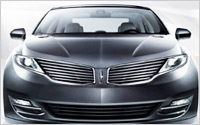 Luxury automakers are focusing both on old-fashioned relationships at the dealership, and high-technology differentiators, but not so much on the less
tangible aspects of brand equity. Nowadays “intangible” is a nice way of saying amorphous.
Luxury automakers are focusing both on old-fashioned relationships at the dealership, and high-technology differentiators, but not so much on the less
tangible aspects of brand equity. Nowadays “intangible” is a nice way of saying amorphous.
Ford's Lincoln division demonstrates that understanding better than a
lot of luxury brands. It's a brand new brand except for the name. Wait -- even the name has changed: It's Lincoln Motor Company. The company has no choice but to start from scratch in vehicle design,
technology, and brand identity. But the Ford division has a few things in common with another luxury automaker -- Infiniti -- although the two on the surface could not have less in common (besides one
being domestic, the other the Japanese luxury division of Nissan Motor.)
advertisement
advertisement
Chief marketers for the two brands plus Michelle Morris, auto industry director at Google, talked about the
premium sector at the J.D. Power 2013 Automotive Forum on Tuesday. She pointed out right up front that you can pretty much forget about counting on loyal buyers these days, unless those buyers are
over 60. "Younger buyers are more open-minded," she said. "Gen Y, who have $200 billion in buying power, are looking at four-plus brands when they shop, doing a lot of cross shopping, and are after
'whole experience'."
In other words, these shoppers are far more likely to get their computer at the Apple Store instead of Best Buy if only because the experience is way better.
Sorry, Best Buy. No different when it comes to apparel. "When you go to Burberry's site, they show you what the inside of their stores look like." The brand is also, basically, its own content
company.
Both Infiniti, which moved to Hong Kong and is redoing its vehicle nomenclature, and Lincoln, which created a new agency in New York -- HudsonRouge -- are throwing out the
old furniture. Matt VanDyke, global director of marketing, sales and service for Lincoln, said Morris' reiteration about declining brand loyalty is good news for the brand.
"We are really at the very early stages of a transformation, starting with product and global expansion," he said. "We had really lost a generation of the luxury market and we acknowledge
that we came off the radar, now as we reinvent we have to tap into what's important to new customers." He said the fact that a new generation of luxury buyers are less ostentatious and not so
concerned with the name on the grill is a help to Lincoln. "They want understated luxury. Customer service and dealership experience is now more important. And consumers say no brand is meeting that
right now."
There's a big focus across market segments on console-based entertainment and information systems, but Ben Poore, Infiniti's VP, said Infiniti had to work on
how to talk about less obvious technology, such as its back-up collision avoidance system introduced in the JX crossover. "We struggled with how to communicate that when we launched the JX; we tested
the system by putting toy fire engines, cozy coops, toys behind it and it just emotionally smacked dead center in customers' lives." Ads showed a JX backing out of a driveway and stopping just short
of colliding with a small child on a bicycle. "We put technology in the context of someone's life and had a story. it's fruitful. Customers say 'I want that, it makes sense to me'."
He said safety technology allows it to redefine performance beyond speed, torque and handling. "We are known for performance, but you have to go beyond that." As for infotainment systems
that let drivers connect smartphone capability with onboard interfaces, the critical thing is simplicity. "I think this is a group who have always known technology is critical. So simpler is better,
but any technology has to work to make something better or it won't take."